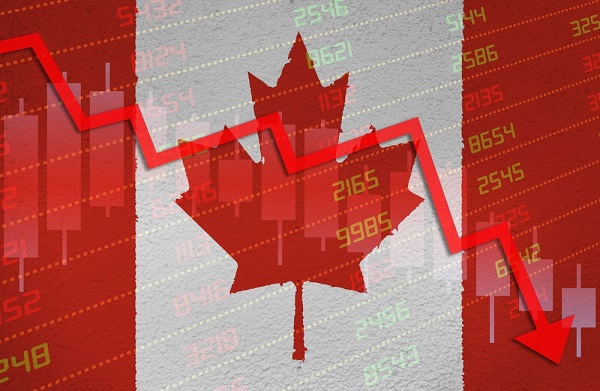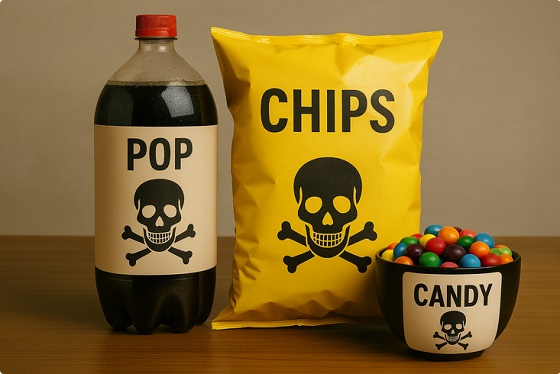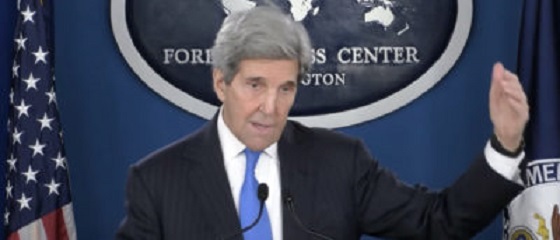Opinion
‘Secret’ RCMP memo blames everyone but the Liberals for Canada’s misery

From LifeSiteNews
By Kennedy Hall
This is, of course, about Canada’s Conservative leader Pierre Poilievre, a man whom the left has tried to turn into a Super Trump since the day he stood up against COVID totalitarianism.
According to the National Post, a “secret” RCMP report that warns of a potential revolt by Canadians, once “they realize how broke they are,” has been unearthed by way of an access to information request.
Secret RCMP report warns Canadians may revolt once they realize how broke they are https://t.co/7IW4gjmS8v pic.twitter.com/Dq8obMHPKl
— National Post (@nationalpost) March 20, 2024
The report begins: “A secret RCMP report is warning the federal government that Canada may descend into civil unrest once citizens realize the hopelessness of their economic situation.”
Now, before we get into the meat of the supposed predictions, I think we would be wise to look at the information with a certain interpretive key. Keep in mind that the RCMP has become a Liberal Party institution, and we needn’t look any further for proof of that than the disgraced former RCMP Commissioner Brenda Lucki, who was appointed by Trudeau and subsequently gave him a run for his money with how many scandals she was caught up in.
COVID, Russia, and climate change destroying the world
The report — heavily redacted and embedded at the bottom of the article — starts with a stunning statement. It reads: “The global community has experienced a series of crises, with COVID-19, supply-chain issues, and the Russian invasion of Ukraine all sending shockwaves throughout the world.” It goes on to say that the situation will “probably” get worse and the “early effects of climate change and a global recession” will only add fuel to the fire of the deterioration of Canada and the global community.
Note that this striking claim is presented as fact, without proof or evidence, and is the leading thought of the document. The report goes on to say: “The coming period of recession will … accelerate the decline in living standards that the younger generations have already witnessed compared to earlier generations.” It adds that “many Canadians under 35 are unlikely ever to be able to buy a place to live.”
So, the theme of the document is that the world, and Canada in particular, is going to hell in a hand-basket, and the reasons for that are primarily COVID, Russia, the climate, and not the government. How convenient! After almost a decade of Trudeau, a report surfaces when his popularity is in the sewer that blames everyone but him for the deciding state of the country he has done his best to ruin.
READ: Deputy PM Chrystia Freeland is championing ‘decarbonization’ at the WEF as Canada falls apart
Karl Marx and the conspiracy nuts
Tellingly, after hammering home the dire situation on the horizon — where it will be if the Liberals have their way — the document predicts that the coming dark age will be accelerated by “popular resentment” and “paranoid populism.”
Now, any astute reader of the news with right-leaning sensibilities will understand what those terms mean. “Popular resentment” is a dog whistle for a Marxist worldview that pits groups of people against one another in a “struggle” for prosperity. “Paranoid populism” is an abbreviation of “People who are involved in populist movements, like Donald Trump — and by extension Poilievre — supporters, are paranoid conspiracy nuts.”
The popular resentment section reads: “The fallout from this decline in living standards will be exacerbated by the fact that the difference between the extremes of wealth is greater now… than it has been at any time in several generations.”
Translation: The rich are lording over the poor, and the poor are poorer than they ever have been. Of course, there is some truth to this, as there is always truth to this in human society where there are always “haves” and “have nots.”
The section on paranoid populism then tellingly implies that those afflicted by populist paranoia will pounce on this struggle. It reads: “Capitalizing on the rise of political polarization and conspiracy theories have been populists willing to tailor their messages to appeal to extremist movements. Authoritarian movements have been on the rise…”
Amazing. According to this report, we are living in a Marxist moment where the proletariat is struggling for their survival against the bourgeoisie, and the real threat is the rise of a populist movement which appeals to extremists with conspiracy theories. Again, a liberal institution will put the blame for the apocalypse on anyone but liberals.
This is really about Poilievre
Now, if you were a betting man, who do you think the document is referring to, given that it is a Canadian document that has been conveniently released just when the Conservatives have threatened to topple the government with a non-confidence motion? This is, of course, about Conservative leader Pierre Poilievre, a man whom the left has tried to turn into a Super Trump since the day he stood up against COVID totalitarianism. Poilievre is far from a right-wing Christian hero — he holds views incompatible with Christian morality — but he is still enough of a populist and common-sense politician that he represents a mortal threat to the regime.
Is the Canadian economic situation bleak? Yes. Will it take a lot of work and common-sense governance to turn things around? Of course. And, again, Poilievre is not the savior, but the man can at least do proper math and understands what the average Canadian is struggling with. If he enacts any of his red tape removing policies, surely Canada will be able to start recovering. The Liberals cannot abide this, as they clearly want to destroy this nation.
It is clear by this point that the Liberal Party will be decimated in the next election, whenever that is, as every poll imaginable has them losing so many seats that they will be able to drive to work together in an airport shuttle van. And, since liberals are incapable of self-reflection and critical thinking, their only hope in their hopeless situation is to sound the alarm of the coming Canadian Armageddon and warn Canadians that it is everyone but they who are to blame, and the opposition will only burn the country down faster than a wildfire that was caused by conservative disbelief in climate change.
For my money, this “secret” document is nothing but a piece of propaganda from a desperate regime.
C2C Journal
Learning the Truth about “Children’s Graves” and Residential Schools is More Important than Ever

This is a special preview article from the:
By Tom Flanagan
When the book Grave Error was published by True North in late 2023, it became an instant best-seller. People wanted to read the book because it contained well-documented information not readily available elsewhere concerning the history of Canada’s Indian Residential Schools (IRS) and the facts surrounding recent claims about “unmarked graves.”
Dead Wrong: How Canada Got the Residential School Story So Wrong is the just-published sequel to Grave Error. Edited by Chris Champion and me, with chapters written by knowledgeable academics, journalists, researchers and even several contributors who once worked directly in residential schools or dedicated Indian hospitals, Dead Wrong was published because the struggle for accurate information on this contentious subject continues. Let me share with you a little of what’s in Dead Wrong.
Outrageously, the New York Times, the world’s most influential newspaper among liberals and “progressives”, has never retracted its outrageously false headline that “mass graves” were uncovered at Kamloops in 2021. Journalist Jonathan Kay exposes that scandal.
With similarly warped judgment, the legacy media were enthused about last year’s so-called documentary Sugarcane, a feature-length film sponsored by National Geographic and nominated for an Academy Award. The only reporter to spot Sugarcane’s dozens of egregious factual errors was independent journalist Michelle Stirling; her expose is included in Dead Wrong.
In spring 2024, the small Interior B.C. city of Quesnel made national news when the mayor’s wife bought ten copies of Grave Error for distribution to friends. After noisy protests by people who had never read the book, Quesnel city council voted to censure Mayor Ron Paull and tried to force him from office. It’s all described in Dead Wrong.
Also not to be forgotten is how the Law Society of B.C. has forced upon its members training materials that assert against all evidence that children’s remains have been discovered at Kamloops. As told by James Pew, B.C. MLA Dallas Brodie was expelled not from the NDP but from the Conservative caucus for daring to point out this obvious and incontrovertible
falsehood. But the facts are that ground-penetrating radar (used at the former Kamloops IRS) can detect only “anomalies” or “disturbances”, not identify what those might be; that no excavations have been carried out; and that no human remains whatsoever, let alone “215 children’s bodies”, have been found there. Brodie is completely correct.
Then there is the story of Jim McMurtry, suspended by the Abbotsford District School Board shortly after the May 2021 Kamloops announcement. McMurtry’s offence was to tell students the truth that, while some Indigenous students did die in residential schools, the main cause was tuberculosis. His own book The Scarlet Lesson is excerpted in Dead Wrong.
Historian Ian Gentles and former IRS teacher Pim Wiebel offer a richly detailed analysis of health and medical conditions in the schools. They show that these were much better than what prevailed in the Indian reserves from which most students came.
Another important contribution to understanding the medical issues is by Dr. Eric Schloss, narrating the history of the Charles Camsell Indian Hospital in Edmonton. IRS facilities usually included small clinics, but students with serious problems were often transferred to Indian Hospitals for more intensive care. Schloss, who worked in the Camsell, describes how it delivered state-of-the-art medicine, probably better than the care available to most non-native children anywhere in Canada at the time.
Rodney Clifton’s contribution, “They would call me a ‘Denier,’” describes his personal experiences working in two IRS in the 1960s. Clifton does not tell stories of hunger, brutal punishment and suppression of Indigenous culture, but of games, laughter and trying to learn native languages from his Indian and Inuit charges.
And far from the IRS system being a deliberate, sustained program of cultural genocide, as Toronto lawyer and historian Greg Piasetzki explains, the historical fact is that “Canada Wanted to Close All Residential Schools in the 1940s. Here’s why it couldn’t.” That’s because for many Aboriginal parents, particularly single parents and/or those with large numbers of children,
residential schools were the best deal available. In addition to schooling their kids, they offered paid employment to large numbers of Indigenous Canadians as cooks, janitors, farmers and health care workers, and later as teachers and even principals.
Another gravely important issue is the recent phenomenon of charging critics with “residential school denialism.” This is a false accusation hurled by true believers in what has become known as the “Kamloops narrative”, aimed at shutting down criticism or questions. A key event in this process was when NDP MP Leah Gazan in 2022 persuaded the House of Commons to approve a
resolution “That, in the opinion of the House this government must recognize what happened in Canada’s Indian residential schools as genocide.”
In 2024, Gazan took the next step by introducing a private member’s bill to criminalize dissent about the IRS system. Remember, the slur of “denialist” is a term drawn from earlier debates about the Holocaust. Gazan’s bill failed to pass, but she reintroduced it in 2025. Had such provisions been in force back in 2021, it might well have become a crime to point out that the
Kamloops GPR survey had identified soil anomalies, not buried bodies. Frances Widdowson examines this sordid political campaign of denunciation.
As the proponents of the Kamloops narrative fail to provide convincing hard evidence for it, they hope to mobilize the authority of the state to stamp out dissent. One of the main goals behind publication of Dead Wrong is to head off this drive toward authoritarianism.
Happily, Dead Wrong is already an Amazon best-seller based on pre-publication orders. The struggle for truth continues.
The original, full-length version of this article was recently published by C2C Journal.
Tom Flanagan is the author of many books on Indigenous history and policy, including (with C.P. Champion) the best-selling Grave Error: How the Media Misled Us and the Truth about Residential Schools.
Bruce Dowbiggin
Sometimes An Ingrate Nation Pt. 2: The Great One Makes His Choice

@PaulChampLaw So, Wayne Gretzky flew on an FBI jet in April 2025 with Kash Patel to watch the Capitals? We all make choices…
Canadians always liked to see themselves as a reflective people. Not hurried into extremes. Slow to anger, quick to act on danger. Humble guys like Wayne Gretzky or Bobby Orr.
If there’s one thing that pissed them off it was anyone sucking up to Americans. Unless… they make it BIG in the U.S.. There was a big exemption for Canadians like Gretzky or Orr or Mike Myers who went south to make a fortune. For them the standards didn’t apply. They were heroes of the nation.
Until Donald Trump. Any Canadian hero not calling him Cheeto or Orange Man Bad or Hitler can expect to receive the mark of Cain from the Left huddling in the Great White North. Anyone excoriating POTUS 45/ 47 , however, is given a lifetime hall pass. No exceptions.

As Gretzky has learned again. Sunday a new photo emerged of the greatest offensive star in NHL history playing golf with the president at his Jupiter, Florida, golf course— the one where Ryan Wesley Routh tried to assassinate Trump. This led to the same predictable rending of garments and clutching of pearls that greeted Gretzky’s earlier declaration of loyalty to The Worst Human Being Ever®. Traitor is now the mildest description of 99 chez nous.
Give the Gretzkys credit, they didn’t disguise their decision. After Trump’s stunning (to some) win last November, Janet Gretzky cooed, “Congratulations Mr. President Donald J Trump ♥️🤍💙🇺🇸 You did it, You deserved it, you earned every bit of it. The world is a better place to have you as our Leader. Proud to be an American. Thank you for being such a great friend. May God keep watching over you ♥️🙏🏻♥️ Love our family to yours !”

The incensed Canadian left swung into action. “University of Alberta professor Robert Summers @RJSCity: “He’s been a pretty unlikable guy for a long time, this just further solidifies it. @ktownkeith: “Gretzky is disgusting and pathetic. I will celebrate when Ovechkin breaks his record. Also FYI, Mario was the best hockey player ever, not Whine Gretzky.” “People should burn all their old hockey jersey and cards of this guy. A shame”. And those were the nice ones.
The bile harkened to Orr supporting Trump in 2020. In our column at the time we noted the furious aftermath from Canadian hockey worshippers. Canadian sports media called Trump a “monster”, a “racist” and “a totalitarian”. You could heat most of the GTA with the steam emitted by their indignation at Orr having the temerity to speak out politically.

Orr has taken a low profile since, as even some in his hometown of Parry Sound wants nothing to do with him. “Poor Parry Sound,” tweeted Mary Lou George on Oct. 31, 2020. “What a disgrace #BobbyOrr has turned out to be. Guess he believes bragging about assaulting women really is just locker room talk since he wants Trump on his team. Sad.”
As with everything in the current McCoys vs Hartfields feud between the countries the venom launched at Gretzky’s decision to support Trump is underscored by the quaint notion that Canada is anything like it was when Gretzky’s 1988 wedding was a national celebration in Canada.
As the polling from the 2025 Canadian federal election showed young people are fed up with their Boomer parents’ nostalgia for the nation that smuggled the American diplomats out of Iran in 1979. They want economic opportunities and the ability to buy homes. What successive Liberal governments have given them is trans insanity, cities overrun by Hamas protesters and national debt backloaded on their shoulders.
To say nothing of Chinese infiltration of the economy and trade. No wonder they keep trying to change the words to O Canada all the time.
The decisions by Gretzky and Orr, among many expats, is partially due to Trump’s contrarian stance. But it also reflects a distance from the land where they grew up. Mike Myers and Elbows Up played on this sentimental loyalty to help Mark Carney succeed Justin Trudeau. But as more and more financial and talent stacks head south for opportunity (see Nutrien’s decision to ship Saskatchewan potash via the U.S., ignoring B.C.) it’s becoming clear that a reckoning is coming.
Trump’s brusque brushoff of Canada as no better than a 51st state was like an intervention with a friend or family member who’s gotten lost. It was a chance for self examination as we said in this 2018 column, Sometimes An Ingrate Nation.
Instead they bought the fake line that Trump would “invade” the country. Canadians lamented their treatment of “loyal old friend Canada”. But since the Iran heroics what has Canada done to help the U.S.? America has guarded Canada militarily. It has protected the trade lanes where Canadian goods are shipped. It has accepted hundreds of thousands of health patients unable to receive timely treatment in Canada’s single payer system.
It has encouraged Canada an automobile industry. It has allowed Canada’s film and TV industry subsidies. It has (so far) tolerated Canada’s dairy cartels. And it has welcomed Canadians by the millions to holiday or invest in America.
Now list the selfless deeds Canada has performed for America since Ken Taylor squirrelled the diplomats out of Tehran. Um… give us time. We sent Orr and Gretzky to the U.S. to jumpstart hockey. And all the SCTV folks. Canada also became the home for every foaming leftist in America seeking to escape Trump. Beyond that? Diddly squat.
So instead of the prolonged lamentations of the women and men and others of Canada, perhaps Elbows Up should listen to VPOTUS J.D. Vance. “And with all due respect to my Canadian friends, whose politics focus obsessively on the United States: your stagnating living standards have nothing to do with Donald Trump or whatever bogeyman the CBC tells you to blame. The fault lies with your leadership, elected by you.”
Bruce Dowbiggin @dowbboy is the editor of Not The Public Broadcaster A two-time winner of the Gemini Award as Canada’s top television sports broadcaster, his new book Deal With It: The Trades That Stunned The NHL And Changed hockey is now available on Amazon. Inexact Science: The Six Most Compelling Draft Years In NHL History, his previous book with his son Evan, was voted the seventh-best professional hockey book of all time by bookauthority.org . His 2004 book Money Players was voted sixth best on the same list, and is available via brucedowbigginbooks.ca.
-

 Alberta1 day ago
Alberta1 day agoNet Zero goal is a fundamental flaw in the Ottawa-Alberta MOU
-

 Energy13 hours ago
Energy13 hours agoCanadians will soon be versed in massive West Coast LPG mega-project
-

 Food1 day ago
Food1 day agoCanada Still Serves Up Food Dyes The FDA Has Banned
-

 Daily Caller2 days ago
Daily Caller2 days agoJohn Kerry Lurches Back Onto Global Stage For One Final Gasp
-

 Addictions1 day ago
Addictions1 day agoManitoba Is Doubling Down On A Failed Drug Policy
-

 Alberta22 hours ago
Alberta22 hours agoKeynote address of Premier Danielle Smith at 2025 UCP AGM
-

 National2 days ago
National2 days agoEco-radical Canadian Cabinet minister resigns after oil deal approved
-

 COVID-191 day ago
COVID-191 day agoFDA says COVID shots ‘killed’ at least 10 children, promises new vaccine safeguards




